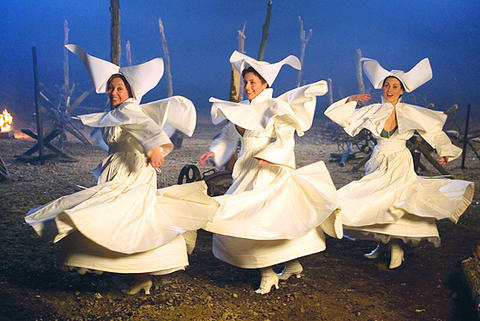Mozart intended The Magic Flute to be fun. Written in the last days of the composer's life, he wanted to create a crowd-pleaser. Despite the glorious music, the manic sense of fun and the fairy-tale romanticism, The Magic Flute has been relegated to the temples of high culture, seen only by the suited and gowned in the rarefied atmosphere of an opera house.
Kenneth Branagh's cinematic adaptation of the opera puts The Magic Flute right back where it belongs - in the world of popular art. Ever since his directorial debut in 1989 with Shakespeare's Henry V, the director has tirelessly made classic plays accessible to a new generation. It must be said that he has not always been successful: His 2006 adaptation of As You Like It, set in feudal Japan, will hopefully sink quietly into oblivion.
But his willingness to take risks is not in doubt. Setting Mozart's work against a World War I background (a harsh transplanting from its original setting in ancient Egypt) has irked some critics, who see it as needless tampering and a distraction from the music. But unlike As You Like It, in which the new setting, one suspects, simply offered a chance to have Japanese fans and sliding doors, in The Magic Flute, Branagh uses the backdrop to make a modern plea for peace.

PHOTO COURTESY OF CINEPLEX
In giving the film a political dimension, Branagh makes a successful appeal to an audience for whom inspired nonsense is not quite enough - after all, this work has been enjoyed for centuries despite a plot that really does not make much dramatic sense.
The story goes something like this: Pamina, daughter of the Queen of the Night, has been kidnapped. Prince Tamino is chased by a snake and falls unconscious. (In this case, the snake is a serpentine smoke of mustard gas.) He is saved by the buxom servants of the queen, who recruit him to rescue Pamina from her abductor Sarastro. Tamino embarks on his adventure with Papageno, the birdman. Tamino discovers that Sarastro is not the evil tyrant that he had been led to believe, but a person of great wisdom. He undergoes a number of trials to be initiated into Sarastro's following. His love for Pamina helps him endure these trials, but the stress of being in Sarastro's court causes both Pamina and Papageno to contemplate suicide. Both are stopped in the nick of time. The Queen of the Night, having failed to destroy Sarastro through Tamino, launches an assault against him. It is foiled, and so the story ends.
It is all utter nonsense, but rich and inspirational nonsense, in the tradition of Alice in Wonderland. It must be said at this point that while the film is purportedly in English, much of the exposition is sung in strung-out operatic riffs, making it difficult to follow. The vernacular libretto by Steven Fry gives the opera a rich comic vein (for an English speaking audience at least). This vintage Branagh piece takes high, and seemingly inaccessible art, and brings it to eye-level, were all can see and enjoy the treats, not just of Mozart's music, but of a wonderful fairy-tale told by a narrator who understands his contemporary audience.

On April 26, The Lancet published a letter from two doctors at Taichung-based China Medical University Hospital (CMUH) warning that “Taiwan’s Health Care System is on the Brink of Collapse.” The authors said that “Years of policy inaction and mismanagement of resources have led to the National Health Insurance system operating under unsustainable conditions.” The pushback was immediate. Errors in the paper were quickly identified and publicized, to discredit the authors (the hospital apologized). CNA reported that CMUH said the letter described Taiwan in 2021 as having 62 nurses per 10,000 people, when the correct number was 78 nurses per 10,000

As we live longer, our risk of cognitive impairment is increasing. How can we delay the onset of symptoms? Do we have to give up every indulgence or can small changes make a difference? We asked neurologists for tips on how to keep our brains healthy for life. TAKE CARE OF YOUR HEALTH “All of the sensible things that apply to bodily health apply to brain health,” says Suzanne O’Sullivan, a consultant in neurology at the National Hospital for Neurology and Neurosurgery in London, and the author of The Age of Diagnosis. “When you’re 20, you can get away with absolute

When the South Vietnamese capital of Saigon fell to the North Vietnamese forces 50 years ago this week, it prompted a mass exodus of some 2 million people — hundreds of thousands fleeing perilously on small boats across open water to escape the communist regime. Many ultimately settled in Southern California’s Orange County in an area now known as “Little Saigon,” not far from Marine Corps Base Camp Pendleton, where the first refugees were airlifted upon reaching the US. The diaspora now also has significant populations in Virginia, Texas and Washington state, as well as in countries including France and Australia.

May 5 to May 11 What started out as friction between Taiwanese students at Taichung First High School and a Japanese head cook escalated dramatically over the first two weeks of May 1927. It began on April 30 when the cook’s wife knew that lotus starch used in that night’s dinner had rat feces in it, but failed to inform staff until the meal was already prepared. The students believed that her silence was intentional, and filed a complaint. The school’s Japanese administrators sided with the cook’s family, dismissing the students as troublemakers and clamping down on their freedoms — with